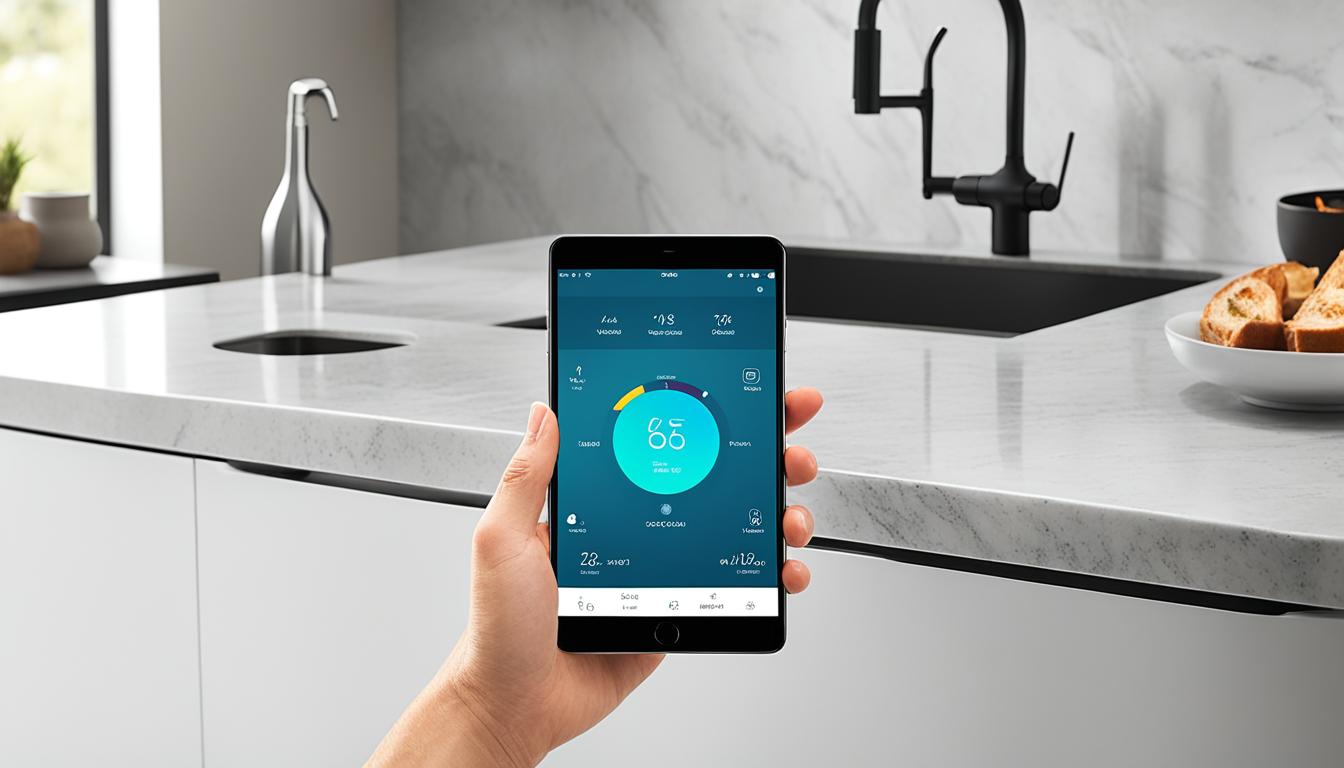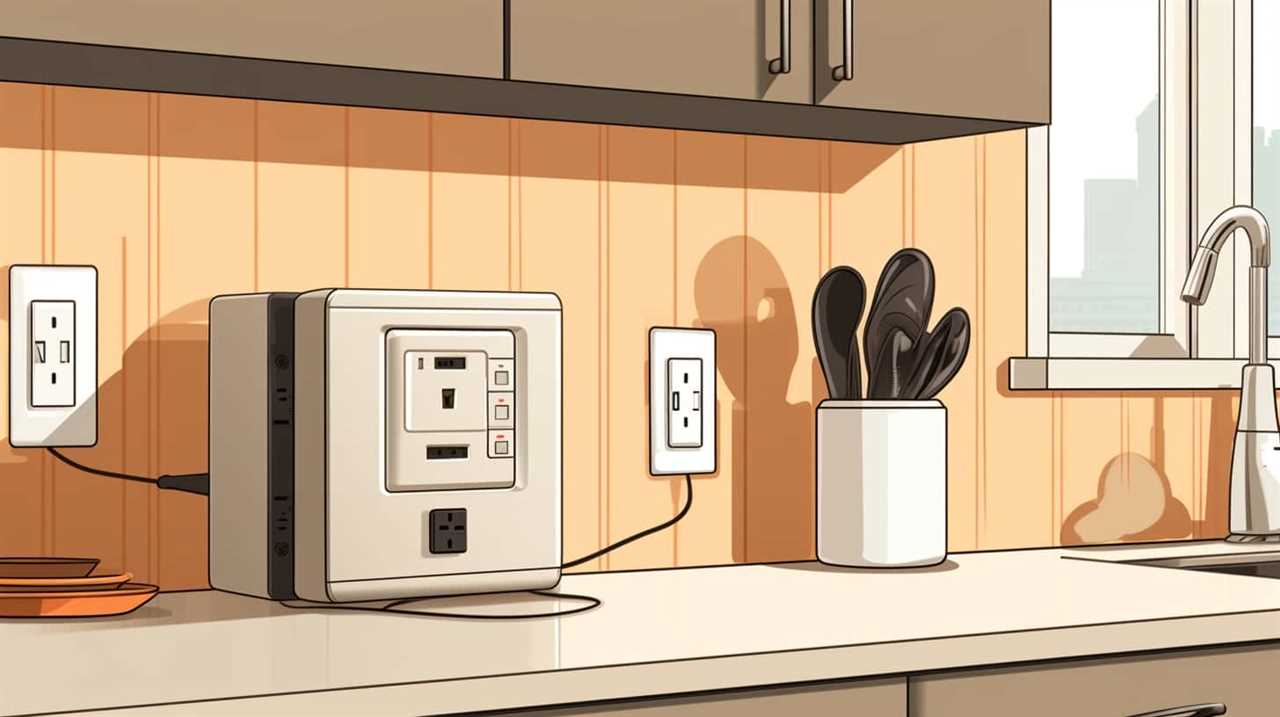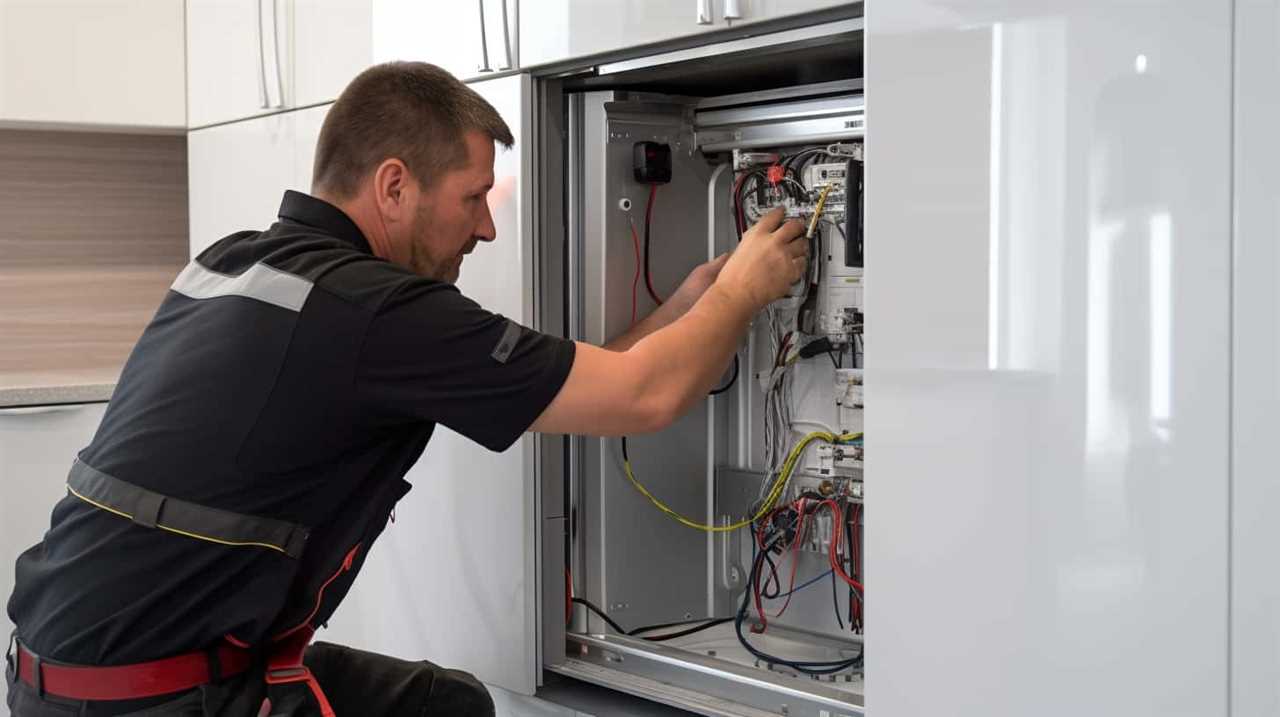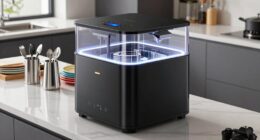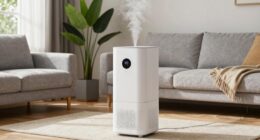Are you aware that smart home devices are revolutionizing our daily lives? These gadgets enhance our comfort and efficiency by seamlessly integrating technology into our homes. They automate household tasks and enable homes to respond faster than ever before.
In this article, we talk about how smart home tech can make you more comfortable. We will help you pick the right devices for you. We will give tips on installing them, keeping them safe, using them in eco-friendly ways, and what the future holds. We also cover the challenges and how cost-effective they are.
Key Takeaways:
- Smart home devices revolutionize the living experience, enhancing comfort and efficiency.
- They offer control and automation, managing energy usage, enhancing home security, and providing convenience.
- Choosing the right devices depends on specific needs and lifestyle.
- Installation and integration are crucial for creating a cohesive smart home ecosystem.
- Securing smart home devices and protecting privacy is essential.
The Benefits of Smart Home Technology
Smart home tech makes life easier every day. You can control and automate your home with it. This brings convenience, saves energy, and keeps you safe.
1. Efficient Energy Usage
Smart home tech helps use energy better. Smart thermostats adjust the heat to fit your schedule. This saves money. Smart lights turn off when rooms are empty, saving more energy.
2. Enhanced Home Security
Smart home devices make your home safer. They include smart locks and doorbell cameras. You get alerts and can check your home from anywhere. This keeps you and your loved ones safe.
3. Convenience and Comfort
Control your home easily with a smartphone or voice commands. Adjust thermostats or lights, and even make coffee. These devices learn what you like for a comfy life.
4. Integration and Compatibility
Smart home devices work well together. Control them all with one app or voice assistant. This makes using your smart home easy and improves how it works.
5. Remote Access and Monitoring
You can access and watch over your home from anywhere. Check doors or watch security cameras while away. This gives you peace of mind, keeping you connected to your home.
Smart home devices control and automate your home. They make life better by saving energy, keeping you safe, and making your home comfy. Add them to your home for these benefits.
| Benefits | Description |
|---|---|
| Efficient Energy Usage | Smart technology helps optimize energy consumption, resulting in lower utility bills. |
| Enhanced Home Security | Advanced security features such as smart locks and cameras provide real-time monitoring. |
| Convenience and Comfort | Control your home with ease through automated tasks and personalized settings. |
| Integration and Compatibility | Smart devices seamlessly work together, simplifying your smart home experience. |
| Remote Access and Monitoring | Stay connected to your home with the ability to remotely access and monitor devices. |
Selecting the Right Devices
There are many smart home devices available today. It’s important to pick the right ones for your lifestyle. Maybe you care about saving the planet, keeping safe, or having fun. There are devices made just for these needs.
Prioritizing Sustainability
Do you want to save energy? Think about smart thermostats and lights. Smart thermostats adjust on their own to save you energy. They also lower your bills. Smart bulbs let you change light strength and color. This saves electricity while making your home feel right.
Enhanced Security
For better security, try smart locks and cameras. Smart locks let you open doors without keys. You can do it from anywhere. With cameras, watch your home anytime on your phone. This keeps your place and family safe.
Entertainment Enthusiasts
Love entertainment? Get smart speakers and streaming gadgets. Devices like Amazon Echo or Google Home play music and answer your questions. They also control other devices with voice commands. With Roku or Apple TV, watch your top shows easily.
Choosing the right smart devices makes your home better. Whether you want to save energy, feel safe, or enjoy more, there’s something for you. Look for devices that fit what you need and like.
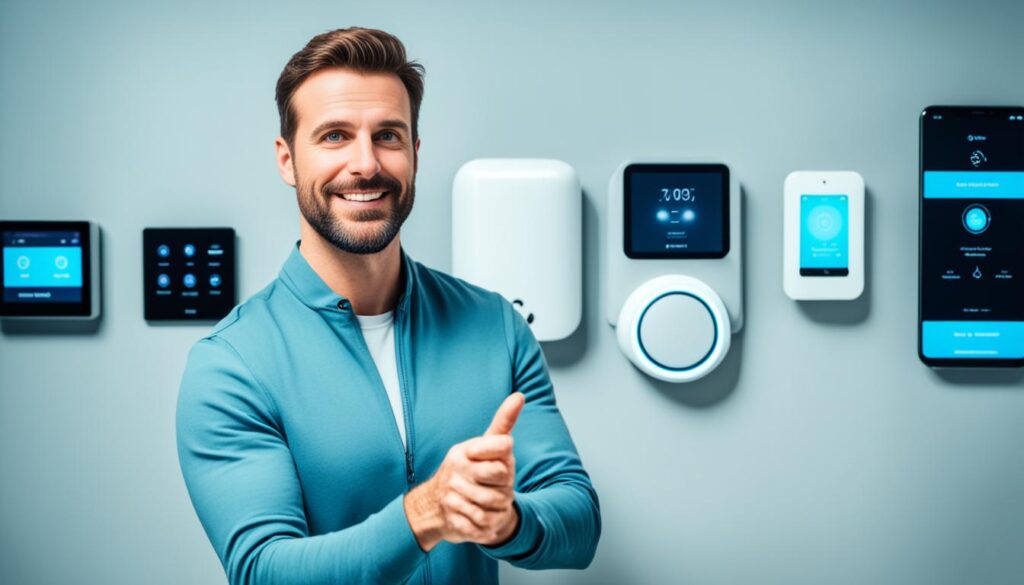
Installation and Integration
Installing smart devices makes your home smarter. It’s key for a connected home experience. Many devices are easy to install by yourself. But, some need a pro, especially for integrating them with your home systems.
Correct setup lets devices talk to each other well. This means you can control your home smoothly. It also stops compatibility problems and makes sure devices work their best.
To install devices, follow the setup steps closely. You might need to connect them to Wi-Fi and set them up on apps. Some devices also need extra gear, like hubs, to talk to each other.
If installing or integrating devices seems hard, ask a pro installer. Or, contact the device maker’s support team for help.
“Proper installation ensures that all devices can communicate with each other effectively, allowing for seamless control and automation throughout your home.”
Integrating devices enhances your home. It lets you manage and check your home in new ways. Use a single app or voice commands for lighting, heating, and more.
For instance, smart lights let you set schedules and change brightness. Smart thermostats can save energy and keep your home comfy.
With a smart ecosystem, devices work together. Your security system could turn on lights and play music when you get home. Or, say “Goodnight” to turn off lights and set the thermostat.
By adding smart devices, your home becomes more modern and tailored to you.

Commonly Integrated Smart Home Devices
| Device | Function |
|---|---|
| Smart Thermostats | Control heating and cooling systems for energy-efficient temperature management. |
| Smart Lighting Systems | Manage and automate lighting, including brightness, color temperature, and schedules. |
| Smart Security Systems | Monitor and protect your home with features like security cameras, door sensors, and smart locks. |
| Smart Home Hubs | Act as a central control point for all smart home devices, enabling seamless integration and communication. |
| Smart Entertainment Systems | Control and stream media throughout your home, managing audio and video devices. |
Managing Security and Privacy
Smart home gadgets make life easier by adding convenience, comfort, and automation. But, these devices come with security and privacy issues. Homeowners need to tackle these to keep their space safe.
To secure smart home devices, start by making your home network strong. This means using a unique password for your Wi-Fi. Change it often to keep hackers out. Adding two-factor authentication also helps by needing a code for entry.
“Homeowners must be ahead of the game in protecting privacy with smart tech. It’s crucial to know what privacy terms and data usage your gadgets have.”
Keeping smart devices updated is key to fighting off hackers. Companies update the software to fix security holes. Make sure you install these updates fast to stay safe.
It’s also key to read the privacy policies of these devices. These documents show how your data is handled. Make sure you’re okay with what they do with your information before using them.
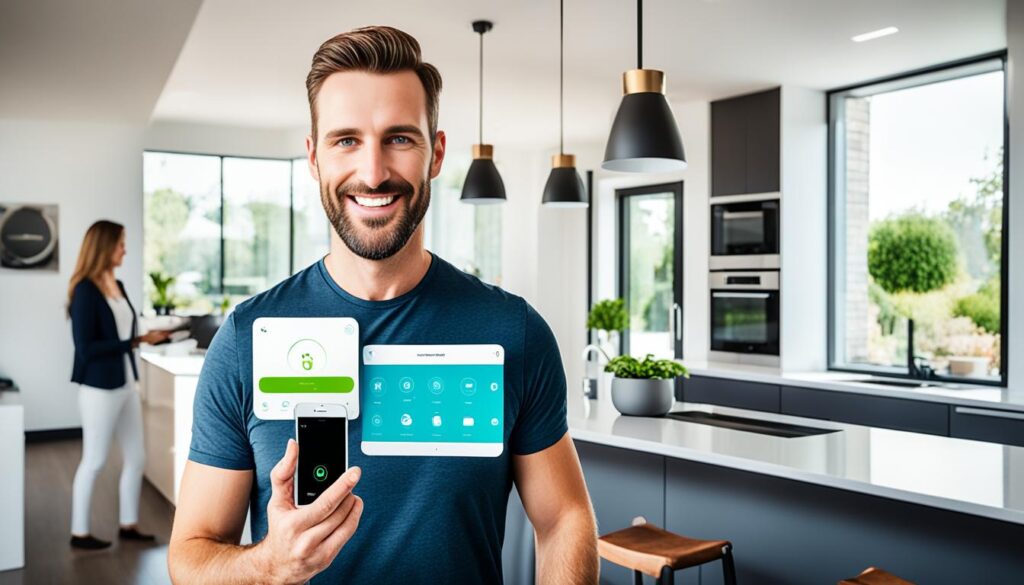
Adding things like smart locks and cameras boosts your home’s security. These tools let you watch your home from anywhere. They also send alerts if something’s wrong and let you control who gets in.
In short, it’s important to secure smart home devices and keep your privacy safe while enjoying tech benefits. By doing stuff like making your network safe, updating devices, and knowing about privacy, you can relax and enjoy your smart home.
Embracing Eco-Friendly Practices
Smart home technology helps us live greener lives. By using energy-saving smart devices, we can cut down on carbon and save on bills. This fits well with the world’s goal for a sustainable future.
Smart home tech is great for saving energy. Smart thermostats control heating and cooling smartly. They adjust based on who’s home, the weather, and what we like. This smart use of energy cuts down carbon and saves money.
Smart lighting is another eco-friendly feature. These systems have sensors and can dim or schedule lighting. Using less power and LED bulbs, we save energy. This cuts carbon and saves money over time.
“Smart lighting lets us save power without losing light quality or comfort. With sensors and schedules, we light our homes smartly and greenly.”
Linking smart devices with green energy boosts eco-friendliness. We can connect to solar panels or wind turbines. This smart use of green power cuts carbon emissions even more.
Choosing eco-friendly smart devices is good for both the planet and us. It cuts carbon and makes us feel good about helping the Earth. Plus, the money we save on energy adds up over time.
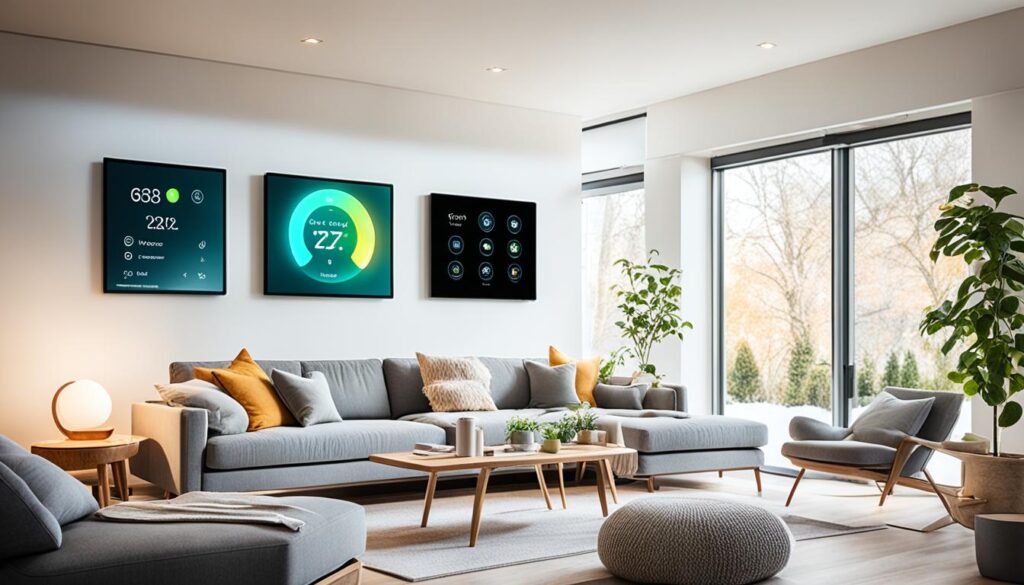
| Benefits of Eco-Friendly Smart Home Devices | Key Features |
|---|---|
| Reduced carbon footprint | – Energy-efficient thermostats- Smart lighting systems- Integration with renewable energy sources |
| Lower energy bills | – Optimized energy usage |
| Sustainability | – Contribution to global sustainability goals |
| Cost savings | – Long-term energy savings- Reduced reliance on traditional power grids |
Eco-friendly smart home devices are a smart choice for the future and a step towards a greener life. By using less energy and cutting emissions, we help the world. Plus, we enjoy the perks and comfort of smart technology.
The Future of Smart Homes
Technology is moving fast, making smart homes even more amazing. They are getting smarter with AI and machine learning. These devices fit our lives and likes perfectly.
AI is key in smart homes now. It makes our homes work better for us. For instance, a smart thermostat learns our schedule to set the perfect temperature. This saves energy and keeps us comfy.
Machine learning helps devices get better by themselves. They study data and predict what we need next. So, we get things done without lifting a finger.
“The future of smart homes lies in their ability to seamlessly integrate with our daily lives, making our homes not just smart, but truly intelligent.” – Smart Home Expert
Imagine your home knows you so well it starts your day right. It makes coffee, sets the lights, and plays music without you asking. AI and machine learning make this dream real.
Future smart homes will also keep us safe. They will spot dangers and act to protect us. AI cameras and sensors will watch over our homes and families.
Smart homes will connect with our cars and health gadgets too. Your car will talk to your home to make it cozy as you arrive. Health devices will check on you and give advice for a better life.
The Potential of AI and Machine Learning in Smart Homes
AI and machine learning have huge potential in smart homes. They promise easier living, less energy use, and smart advice for our routines. They will change how we live at home.
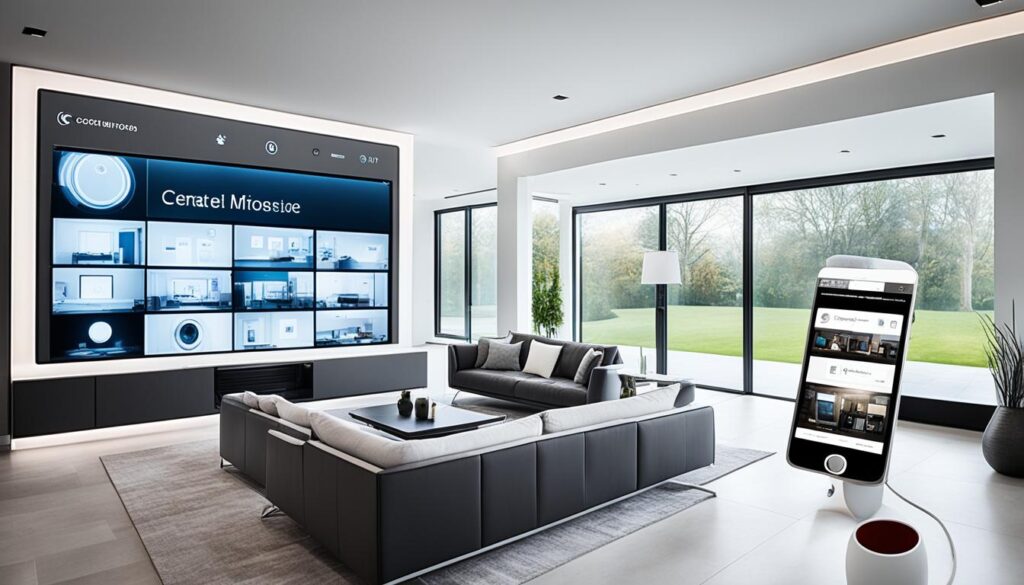
| Advancements in AI and Machine Learning | Impacts on Smart Homes |
|---|---|
| Improved Predictive Analytics | Devices can anticipate user needs and automate tasks for enhanced convenience. |
| Personalized Experiences | Smart homes can adapt to individual preferences and tailor the environment accordingly. |
| Enhanced Security Features | AI-powered cameras, sensors, and facial recognition systems provide seamless home security. |
| Energy Optimization | AI algorithms analyze energy patterns and optimize consumption, reducing costs and environmental impact. |
| Integration with Other Technologies | Smart homes will seamlessly connect with other IoT devices, such as cars and wearables, for a unified experience. |
We’re heading towards a future filled with smart homes. They’ll understand and act on our needs. As AI and machine learning grow, our homes will become more helpful and safe.
Addressing Challenges
Smart home tech brings lots of benefits. But, there are some challenges too. You might find some devices don’t work well together. There could also be a learning curve with new gadgets. Yet, the good points outweigh these issues.
Compatibility Issues:
When you mix smart home devices, they need to match. Not all devices work well together. This can be annoying.
Some smart thermostats might not fit with your heating system. You’d have to work more to make them match. So, be sure to pick devices that fit with what you’ve got.
Learning Curve:
Learning new tech can be hard. This is true for smart home devices too. Getting used to them takes some time. You might feel swamped at first.
But, there’s help. Instructions and support are there to help you. With a bit of patience, you’ll get the hang of it.
A Balancing Act:
Smart home tech also means finding balance. It’s about mixing automation with doing things your way. Some folks like to set their lights manually.
Others might want their lights to turn on by themselves. It’s nice to find the right mix for you. This way, you get the perks of tech without losing control.
“Smart home tech needs patience and a readiness to try new things. The hurdles you face are just steps to a better home.”
Overcoming Challenges:
There are ways to enjoy smart home tech without hassle. Here’s how:
- Research and Compatibility Check: Look up how well gadgets work with what you have. This saves trouble later.
- Start Small and Gradually Expand: Begin with a few devices. Then, slowly add more. This way, you learn as you go.
- Seek Professional Assistance: For tricky setups, get help from experts. They make sure everything works right.
- Stay Updated: Keep your gadgets up-to-date. Updates make things run smoother and better.
Challenges are there, but the advantages of smart home tech are huge. By thinking about what works together, being ready to learn, and asking for help, you can enjoy all it offers.
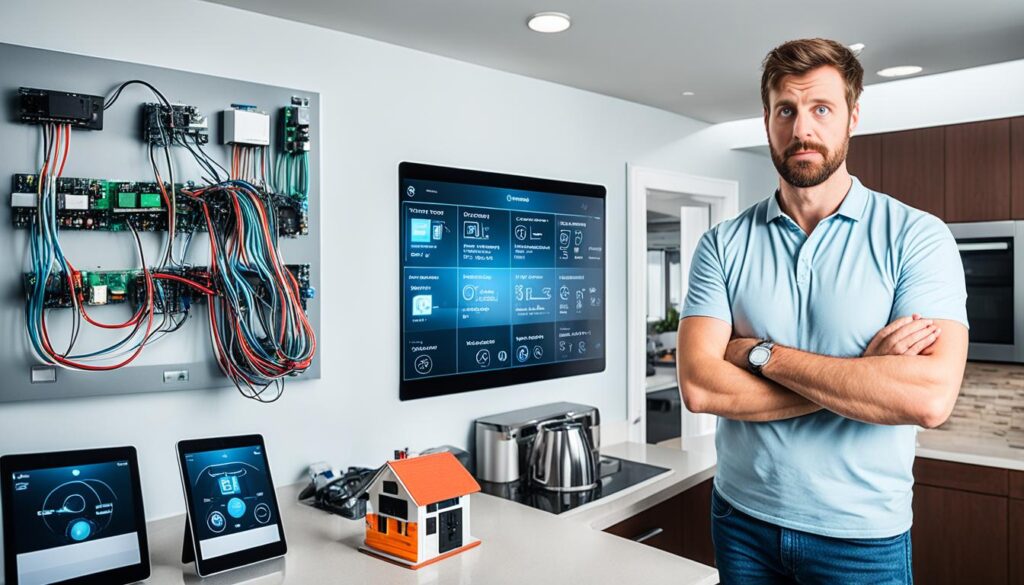
| Challenges of Adopting Smart Home Technology | Ways to Overcome Them |
|---|---|
| Compatibility Issues |
– Thoroughly research device compatibility – Test devices before purchasing – Seek assistance from professionals |
| Learning Curve |
– Follow user-friendly instructions and guides – Take time to explore device features – Seek support from manufacturers or online communities |
| A Balancing Act |
– Experiment with automation and manual control – Fine-tune device settings to personal preference – Customize automation to match lifestyle |
Cost-Effectiveness
Smart home tech can be pricey at first. Yet, its **cost-effectiveness** over time can’t be argued. These devices save a lot on energy, making them a smart money choice.
Take smart thermostats, for instance. They change the heat or AC based on who’s home and the weather. This smart move saves money in the long run. Owners can also track and adjust energy use, cutting down waste and upping **cost-effectiveness**.
Smart home tech also saves money by making life easier. Lights that turn off when not needed and appliances that run when energy is cheapest add up to big savings.
“Smart home tech might cost more upfront. But the savings and ease it brings are well worth it.”
More people want smart home tech, so prices are dropping. More competition and better tech mean it’s getting cheaper. This makes smart homes a good option for people wanting to make their homes better on a budget.

Smart Home Technology: A Table of Cost-Effectiveness
| Smart Home Device | Upfront Investment | Long-Term Savings |
|---|---|---|
| Smart Thermostat | $$ | $$$ |
| Smart Lighting System | $$$ | $$ |
| Smart Appliances | $$$$ | $$ |
| Smart Security System | $$$$ | $$$ |
Front Yard: Creating a Well-Lit and Secure Entrance
The front yard plays a big part in smart home upgrades. Installing smart devices makes the entrance secure and bright. This helps keep intruders away and gives homeowners peace of mind.
Outdoor security cameras are vital for front yard safety. They watch over the area and record any odd activities. With features like motion detection and night vision, they let homeowners watch their yard anytime, anywhere.

Video doorbells are also crucial. They mix a camera with a doorbell, letting homeowners see and talk to visitors through an app. This means you can respond to the door no matter where you are.
Benefits of Front Yard Smart Home Devices:
- Enhanced security: Cameras stop intruders and provide proof if needed.
- Convenient monitoring: Homeowners can check their yard from afar and get alerts of any odd activity.
- Interact with visitors: Video doorbells let homeowners speak to people at the door safely and easily.
- Peace of mind: A secure, well-watched front yard makes families feel safer.
Adding smart devices to your yard boosts security and makes your entrance welcoming for visitors. With remote monitoring and control, homeowners rest easy knowing their home is safe.
Comparing Outdoor Security Cameras:
| Brand | Model | Resolution | Field of View | Night Vision |
|---|---|---|---|---|
| Brand A | Model X | 1080p | 110° | Yes |
| Brand B | Model Y | 4K | 130° | Yes |
| Brand C | Model Z | 720p | 90° | Yes |
When picking outdoor cameras, consider resolution, view, and night vision. Brands and models vary, catering to different needs. Check websites and reviews to choose wisely.
With devices like security cameras and video doorbells, your front yard will be safe and welcoming. These investments modernize your yard and bring the perks of smart tech.
Living Room: Cozy Conveniences for Entertainment and Relaxation
The living room is now the home’s heart, a place for fun, rest, and meeting others. Thanks to smart tech, it turns into a comfort zone. Smart devices like speakers, displays, and light bulbs make life better.
Smart Speakers: Central Command Centers
Amazon Echo and Google Home are key for a smart living room. These devices respond to voice commands. They play music, manage lighting, or set temperature easily. They work well with other devices, making a smart living area.
Smart Displays: Enhanced Functionality at Your Fingertips
Smart displays mix convenience and usefulness. They have touch screens for controlling devices, browsing, and video calls. With a smart display, you can change lights, watch shows, and connect with people easily. They also show weather and calendar events.
Smart Light Bulbs: Customized Ambiance
The right light sets the mood for relaxation or fun. Smart light bulbs adjust and customize lighting easily. They change colors, dim, and schedule lighting. You can control them from smartphones or with voice commands.
“The living room is our gathering spot to relax and enjoy time with loved ones. Smart tech enriches comfort and fun, making it truly smart and linked,” notes Jennifer Smith, a fan of smart homes.
Smart speakers, displays, and light bulbs turn the living room into a place of ease and entertainment. With these devices, the living space upgrades and changes to fit our needs and likes.
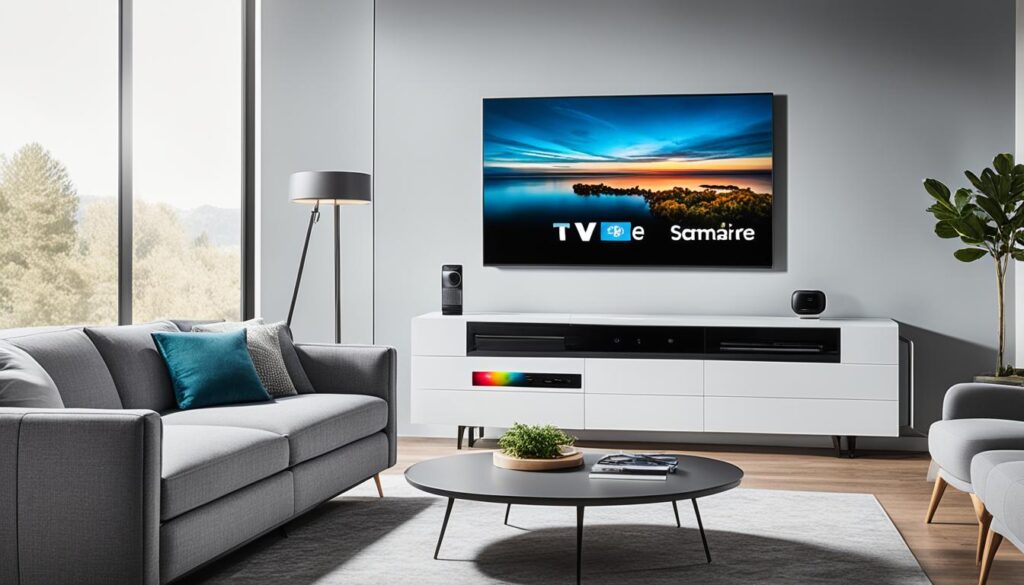
Conclusion
Smart utilities for the home open the door to a more comfy and smart living space. Embracing this tech lets us live in homes that understand and meet our needs. Smart devices for homes are great for saving energy, improving security, and making life easier.
Smart thermostats and lighting help lower energy use and cut down on bills. They adjust settings based on if people are there or what they like. This saves money and helps the planet too.
Smart gadgets make homes safer. With smart locks and cameras, you can watch your home from anywhere. They send alerts if someone tries to break in. This keeps your home safe even when you’re not there.
Smart home tech brings a lot of convenience. With voice commands, you can control lights, heat, and even your TV. This makes daily tasks easier and improves how we live at home.
